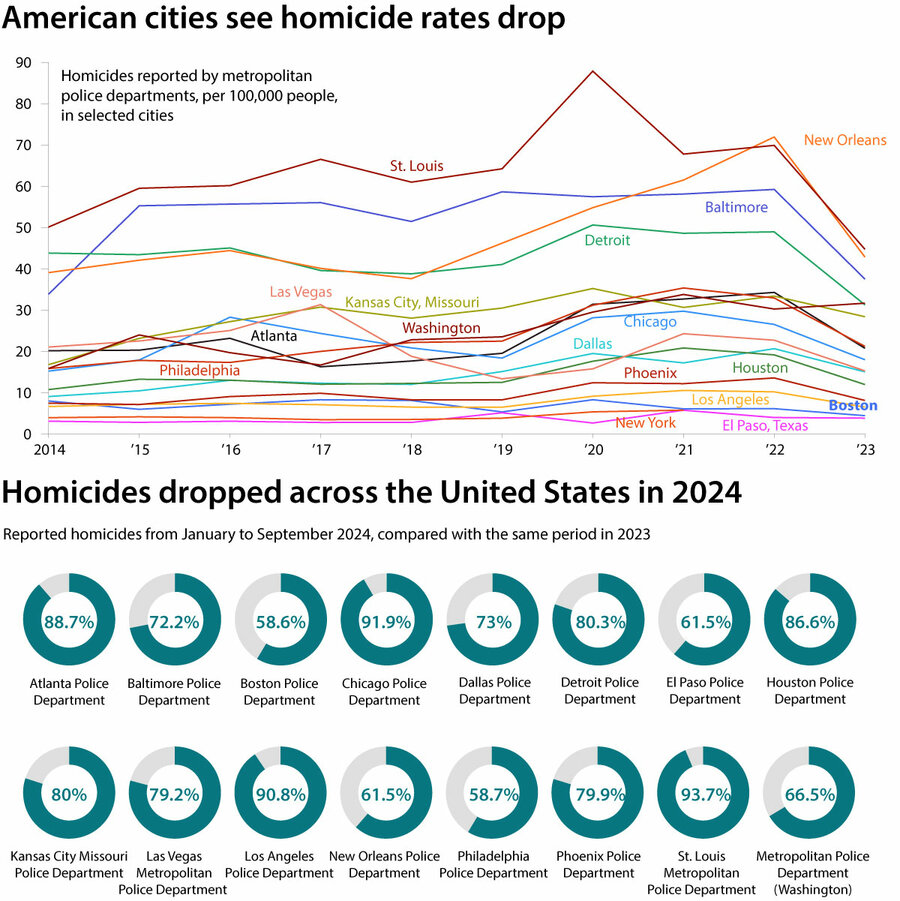Boston broke a record last year for fewest homicides. It’s on track to do it again.
Loading...
| Boston
Boston is on track to set a new record. The city may ring in the new year with its fewest homicides and shootings in a single year – for the second year in a row.
In 2023, it reported 37 homicides, its lowest number ever since the Boston Regional Intelligence Center began counting. The murder rate of 5.29 per 100,000 residents was the city’s lowest in the 21st century.
As of Dec. 10, Boston has reported 22 homicides – a little over half of the 40 it had just two years ago, according to the City of Boston Homicide Dashboard.
Why We Wrote This
A story focused onBoston’s homicide rate is breaking records – as the lowest in its modern history. When it became clear 2024 was going to set another record, we wanted to update our Rebuilding Trust story in May asking, What is the city doing right?
The historic decline began early. In the first quarter, the city of 654,000 residents saw the largest drop among all big U.S. metropolises: Homicides plunged 82% compared with the same period last year, ahead of second-best Philadelphia (37%).
There were only three homicides by June. Even during the summer months, which often see more crime, there were just 17 reported by the end of September – a 60% reduction year to year.
Gun violence remains the leading cause – in Boston, as well as nationwide – with fatal shootings accounting for 18 of this year’s 22 homicides. However, shootings also reached record lows in the city, signaling a broader decline in violent crime.
Last year, Mayor Michelle Wu announced a violence prevention plan to cut homicides and shootings by 20% by 2026. The city has already surpassed that target.
While it’s difficult to pinpoint a specific cause for the steep decline, public safety experts point to the tight-knit network of neighborhood associations and community-based organizations focusing on young people at risk for violence. For his part, Police Commissioner Michael Cox, in early 2024, credited an increase in anonymous tips and the growing trust and cooperation of Boston’s residents.
“There seems to be a renewed effort to include the community in the process of public safety,” says Jack McDevitt, a professor emeritus of criminology and criminal justice at Northeastern University. He also points to Massachusetts’ low gun ownership rate and stricter gun laws.
“Boston has always been a place where the community was involved,” he adds. “But under Commissioner Cox, it looks like he has made a renewed effort to get more community voices, more different neighborhoods, trying to say, ‘What are your problems? How can we deal with them?’ And certainly on top of that list would be homicide.”
While Boston remains an outlier, overall violent crime and homicides have continued to drop in 2024 in the United States, after a spike during the pandemic. When compared with cities with similar population sizes, Beantown has fared pretty well: In 2023, Washington reported 274 homicides, Baltimore had 259, and San Francisco 53.
Professor McDevitt cautions that one or even two years does not a trend make. However, he points out, in 1990 the city recorded 152 homicides – a record high. “Now we’re talking about the 20s. It’s a pretty amazing turnaround.”
To listen to Troy talk about his original story about Boston’s low homicide rate, here’s the Monitor’s podcast.







